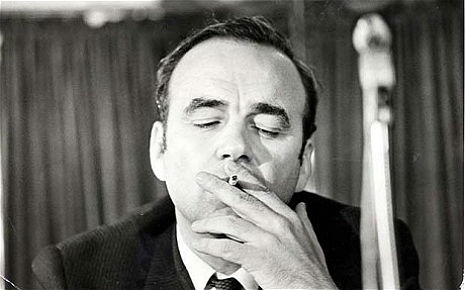
It’s nearly impossible to find a photo of Murdoch when he was young. He was born looking middle-aged, apparently
During a week in which no less than two former British Prime Ministers directly contradicted Rupert Murdoch’s recent sworn testimony to the Leveson Inquiry, an apparently much more inconspicuous Murdoch-related story also bobbed up in The Guardian…
In his recent memoir Special Relations, the well-regarded academic and historian Asa Briggs relates how, in 1952, when Briggs was a 31-year-old Fellow at Worcester College, Oxford, he embarked upon what The Guardian calls a “somewhat unconventional camping holiday around the Middle East” alongside 21-year-old “Philosophy, Politics and Economics” Worcester undergraduate Rupert Murdoch and two others.
“We met Rupert and George [Masterman – one of the other two] in what had been Constantinople, now Istanbul. Rupert had traveled there with his father in the Zephyr, which he had promised his father he would send back to Australia by sea from Port Said. They had had trouble… in crossing [communist] Yugoslavia. Curiously, Rupert was to have trouble too in Jordan.”
Curious indeed. At that time Jordan was a strange place to be making a beeline for.
“King Abdullah had recently been assassinated [by a Palestinian gunman], upsetting the whole balance of power in the Arab world, and there were many signs of tension in all the places on our journey beyond Turkey, through Syria, Lebanon and Jordan. There were Arabs who thought the name Murdoch was associated with the name Mordecai.”
In Lebanon, the entire party found themselves short on funds:
“We made contact with the father on an Oxford postgraduate student who generously offered to lend us what we needed. We arranged to meet him in the market the following day. Our benefactor did not turn up; he had died in the night. He had arranged for us to have the money, however.”
Righteo. Whether Briggs’ entire memoir consists of thinly veiled spying anecdotes or not I don’t know, suffice to say that I enjoyed this particular snapshot. The Guardian, of course, relays it all with an entirely straight face, espying nothing suspicious in the timing, destination or identity of the travelers – one thing it neglects to mention, however, is that Briggs was not only an accomplished historian in the early fifties, but an even more accomplished British intelligence asset, as even his Wikipedea entry nowadays knows:
“From 1942 to 1945 during WWII, Briggs served in the intelligence corps and worked at the British wartime codebreaking station Bletchley Park. He was a member of “the watch” in Hut 6, the section deciphering Enigma Machine messages from the German Army and Air Force.”
The aroma of skulduggery rises liberally from these recollections, which I felt especially timely considering that, decades later, Murdoch’s long-rumoured affiliation with the CIA (the accusation has clung to him since the mid-seventies, thanks in part to his business links with known spooks like Michael Hand) is one of the more pressing yet predictably wholly unsung aspects of the ongoing hacking scandal.
No one at the Leveson Inquiry, for example, seems at all interested why this Australian-born businessman is such a vehement opponent of the European Union, or why his newspapers – when not indefatigably cheering on Anglo-American military adventures – appear to have been conducting large-scale surveillance operations (because that’s what they are) on civilians, police and politicians: propaganda and espionage, of course, being the long term specialities of “The Agency.”
As conspiracy theorist Alex Constantine puts it:
“Perhaps the hideous Rupert Murdoch is not merely an independent “conservative” propagandist whose view of the world is parallel to General Pinochet’s, but one deliberately installed to program public opinion.”
Perhaps so.